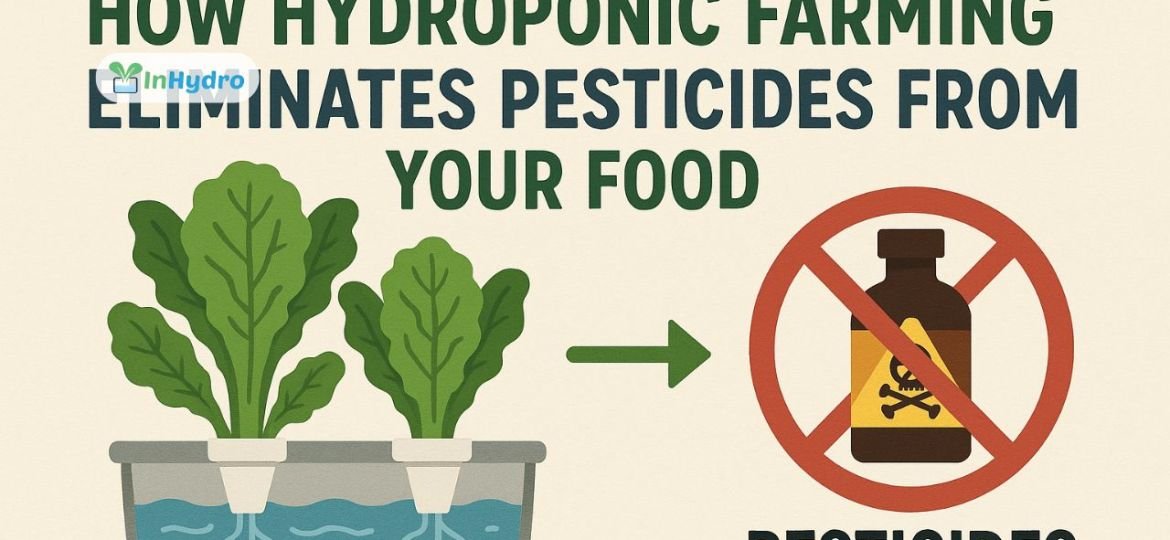
How Hydroponic Farming Eliminates Pesticides from Your Food
Pesticide contamination in fruits and vegetables is a serious concern in India, with increasing health risks linked to chemical residues. As consumers grow more conscious of food safety, there is a shift toward alternative farming methods that can offer cleaner, safer produce. Hydroponic farming, a soil-free cultivation technique, stands out as a solution that completely eliminates the need for harmful pesticides. Here’s how the system works—and why InHydro believes it’s the future of safe agriculture.
Why Pesticides Are Used in Traditional Farming
Conventional soil-based farming in open fields faces several challenges:
- Soil-borne diseases and pests
- Weed infestation
- Uncontrolled environmental exposure
- High humidity and stagnant water leading to fungal growth
To combat these, farmers rely on a variety of chemical pesticides, herbicides, and fungicides. While these may protect crops in the short term, they often leave toxic residues on the produce and leach into the environment.
Hydroponics Creates a Controlled, Pest-Resistant Environment
Hydroponic systems eliminate the root causes that necessitate pesticide use in the first place. Here’s how:
1. No Soil = No Soil-Borne Pests
Soil harbors many fungi, insects, and bacteria that harm crops. Hydroponics completely removes soil from the equation, instantly eliminating soil-borne threats such as root rot, nematodes, and wilting diseases.
2. Sealed, Indoor or Greenhouse Cultivation
Hydroponic farms are often enclosed in greenhouses or polyhouses, which restrict access to insects and pests. This controlled environment agriculture (CEA) reduces the need for chemical intervention.
3. Targeted Nutrient Delivery
InHydro systems deliver customized nutrient solutions directly to the roots, ensuring plant health without external dependency on chemical boosters or disease-prevention sprays.
4. Use of Biological Control (if needed)
In rare cases of pest presence, hydroponic farms can use biological control agents like neem oil, beneficial insects (e.g., ladybugs), or microbial sprays—all natural and non-toxic.
Impact on Consumer Health
Hydroponically grown food is residue-free, making it ideal for:
- Children and pregnant women
- Health-conscious individuals
- Patients requiring chemical-free diets
- Urban consumers with limited access to safe produce
By avoiding pesticide exposure, consumers also reduce long-term health risks such as hormonal imbalances, carcinogenic effects, and neurological disorders associated with regular chemical intake.
Food Safety and Certification
Hydroponic produce is easier to monitor for safety compliance. InHydro enables its partners and clients to follow traceable nutrient management, batch-wise monitoring, and clean packaging, which support certifications like:
- FSSAI compliance
- Global GAP
- Residue-Free Certification
Why InHydro Promotes Residue-Free Farming
At InHydro, pesticide elimination is not just a benefit—it’s a core principle. Our hydroponic systems are designed for:
- Zero chemical dependence
- Consistent crop cycles without pest disruptions
- Safe nutrient protocols tested for Indian conditions
- Support for urban, commercial, and institutional growers
By offering end-to-end project setup and nutrient solution management, InHydro ensures that the produce grown in its systems is naturally protected—without a drop of pesticide.
Conclusion
Hydroponic farming is not just a clean alternative—it is a fundamentally different approach to growing food. By removing soil, controlling the environment, and delivering balanced nutrition, it eliminates the conditions that require chemical pesticides altogether. The result? Healthier crops, safer food, and a cleaner planet.
With InHydro’s advanced hydroponic systems, farms of all sizes can now produce pesticide-free, sustainable, and high-quality food for India’s growing demand. Ready to make the shift? InHydro can help you build a cleaner farming future.

